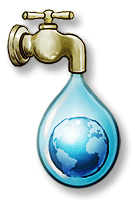Spanish version: Sobre el CEPIS
What is CEPIS
The Pan American Center is a specialized Sanitary Engineering and Environmental Science (CEPIS) center, for Environmental Technology of the Pan American Health Organization (PAHO), and the Regional Office of the World Health Organization.
CEPIS belongs to the Division of Health and Environment of PAHO and supports Latin American and Caribbean countries in solving environmental problems that threaten human health. This is mainly in water supply and sanitation, wastewater treatment and reuse, domestic and hazardous waste management, and others.
The Center promotes programs that reinforce PAHO cooperation among its member’s countries and focuses on developing low-cost technologies which are easy to maintain and operate. The dissemination of information, training and mobilization of human resources, sanitary education and community participation in environmental management projects.
CEPIS is located in Lima, Peru and was established in 1968.
Reasons for CEPIS foundation
Demographic pressure, urban growth, rapid industrialization, depletion of natural resources and life standard demands, continually imposes new damages to the environment throughout the Region.
Poor sanitation persists, or worsens in some cases, which is basic evidence that environmental problems in the Region are vast and complex.
Conscious of its role and responsibility, and as a means to widen its contribution to the development of the environment, PAHO heeded the aspiration of environmental and sanitation professionals aspiration and set up the Pan American Center for Sanitary Engineering and Environmental Sciences (CEPIS). The Center reinforces PAHO commitment to protect and improve environmental health in Latin America as well as the Caribbean Region.
Work strategy
Emphasis is placed on furthering the mobilization and adequate use of national resources in the countries and among other countries as well.
National resources mobilization is accomplished through information dissemination, direct technical assistance, promotion of regional and subregional programs, networking of cooperating centers, developmental skills of researchers, continuing education for professors, and training of trainers.
Activities
Being involved in a regional technical center, CEPIS proposes interdisciplinary solutions to environmental problems, taking socioeconomic conditions and the national infrastructure of each country into account.
CEPIS carries out programs that are aimed at strengthening national institutions which are responsible for protecting environmental health and the control of risks derived from man-made contamination.
CEPIS ongoing programs are:
- Control of surface and groundwater contamination;(Spanish)
- Leakage control and efficient use of water;
- Improvement and surveillance of water quality for human consumption;(Spanish)
- Waste water treatment and reuse;(Spanish)
- Domestic solid waste management;(Spanish)
- Environmentally sound management of residues;(Spanish)
- Improvement of the analytical capability of laboratories;
- Social participation and sanitary education;(Spanish)
- Strengthening the technical information systems;(Spanish)
- Informatic support to the CEPIS programs;
- Disaster preparedness in health and environment(Spanish)
- Healthy cities;
- Household Water and Food Disinfection Study;(Spanish)
- Publications and translations.(Spanish)
Furthermore, CEPIS conducts and encourages applied research on environmental issues both in the countries and at headquarters; collaborates in the development of human resources through courses and other training programs that are offered in the Center or in other institutions; prepares documents and serial publications; and acts as Regional Coordinating Center of the Pan American Information Network on Environmental Health (REPIDISCA).
REPIDISCA operates through a network of 342 Cooperating Centers in 24 Latin American and Caribbean countries. These national institutions disseminate the products and services of the network and also provide input to the bibliographic data base which holds 85,000 records and increases at a rate of around 10,000 records per year. REPIDISCA services are available also VIA e-mail.
The accomplishment of CEPIS programs would not have been possible without the support of the Government of Peru and other international institutions, such as the International Development Research Center (IDRC), the International Water and Sanitation Center (IRC), the Inter-American Development Bank (IDB), The World Bank (WB), and the Japan International Cooperation Agency (JICA). At present, the technical and financial assistance of the German Agency for Technical Cooperation (GTZ) strengthens CEPIS activities and facilitates the Center’s impact of the Region.
Disaster preparedness in health and environment
The purpose of the Program for disaster preparedness in health and environment is to promote and to strengthen the national institutional abilities to reduce the risks and to mitigate the damages which are induced by natural and technological disasters in the health and the environment.
It carries out activities of training throughout courses, seminars, and workshops on the management and planning of the prevention of emergencies and disasters, the vulnerability analysis, and projects of mitigation in the face of the natural and technological disasters in the member countries of the Region, with emphasis on the greater vulnerability countries.
Input of a national program for disaster preparedness (Spanish)
Publications and translations
CEPIS and numerous technical publications in different areas of expertise related to sanitary engineering and environmental science documents.
CEPIS printing with efficient processing for all the documents in the computer center.
The financial support received from a variety of different agencies like the World Bank, GTZ, IRC, UNICEF, among others, makes it possible to translate and publish various documents into Spanish.
Detailed information on the published titles available from our publications catalog that also offers email CATPUB__ under code. Requests for publications can be made through the PAHO or directly to CEPIS.
How to obtain CEPIS services
CEPIS services are available to national agencies, universities, research institutions, local governments, professionals, and students’ from PAHO countries which are involved in environmental issues.
CEPIS services may also be provided to the private and industrial sector since they constitute together with the governmental sector, of the resources our countries use to face environmental problems.
Requests for technical cooperation should be addressed to PAHO Representative Offices in each country. Publications may be ordered through PAHO Representative Offices or directly to CEPIS.

